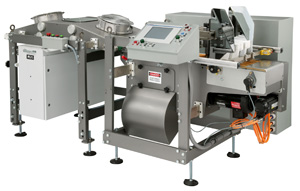Jun 4 2010
Label Vision Systems (LVS) and Roberts PolyPro, a unit of Pro Mach have recently launched ‘CartonSpec’, a high-speed data acquisition and vision inspection system for folding cartons.
 Roberts PolyPro carton inspection system
Roberts PolyPro carton inspection system
The CartonSpec system is a sensor that finds out whether a carton that enters a folder gluer complies with application and printing specifications. It records all standard barcodes for quality assurance, ensuring that the product and the carton are in sync. The records in the database are recorded for mass serialization applications.
The CartonSpec system is very useful for cosmetic and pharmaceutical industries, where risk minimizing, print appearance and quality, and data acquisition are major concerns. CartonSpec’s capabilities will also be beneficial for other industries that are involved in high speed or high volume operations.
High speed dependability of CartonSpec is made possible by the newly created vacuum system of Roberts PolyPro that steadily holds the carton while it is being inspected by the LVS camera. Carton orientation control and solid/mechanical coordination empowers capturing of clear images by the camera even at high speed.
The memory stores master images and related data from completed jobs to enable their recall easily and decrease the set up time. The modular CartonSpec helps users in moving to other folder gluers.
Roberts PolyPro’s General Manager Roy Tetreault informed that the system, inline with folder gluer, is different from other solutions. It can record and inspect data on every folding carton that is sent into the folder gluer at a maximum of 1,000 feet per minute speed.
He explained that the system rejects out-of-specification cartons even before insertion of the product and provides a separate record to manufacturers for all cartons that enter the folder gluer. CartonSpec is able to maintain better assurance by searching for scuffs, barcodes, carton damage, scuffs, and product identification.
North American sales manager, Scott Lydel, added that the only method for inspection of the print quality was offline, which adds labor costs and extra step in manufacturing. In addition, offline inspection caters for only print quality. Labor savings are able to offer a compelling return on investment, while value is added by improved production capabilities and product quality.